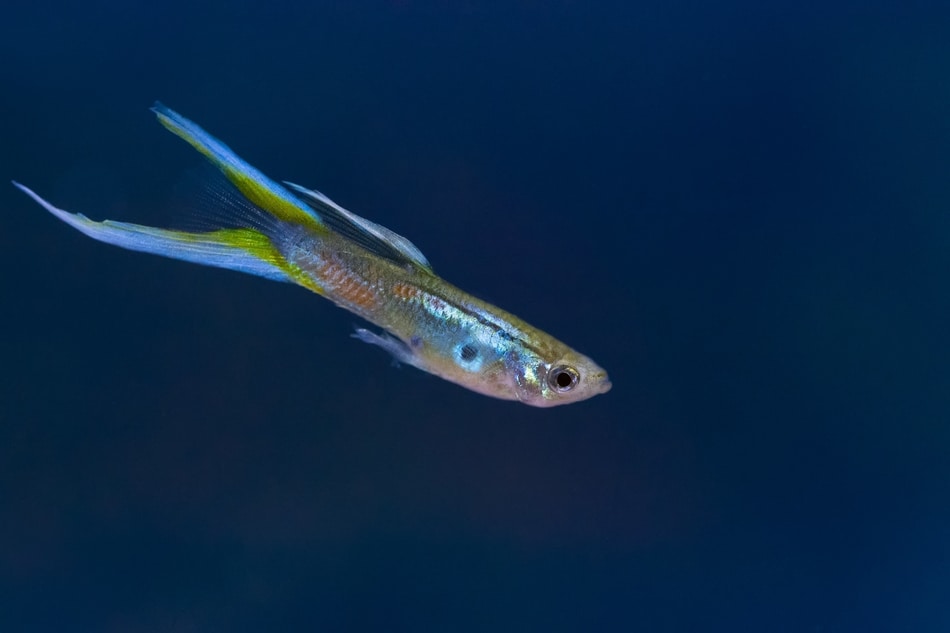
Fishkeepers that love guppies will tell you how they breed like rats. Yeah, that is true. Breeding eventually leads to new guppies in your care, albeit minuscule ones.
Probably, you are there waiting for the fry to hit every growth stage you have learned about from various sources. If you are doing it right, the guppy fry will rapidly grow. Otherwise, the lack of growth in guppy fry can concern an aquarist or fishkeeper.
There are a lot of reasons why your guppy fry is not growing. For instance, the size of your tank and the feeding regimen can be leading causes of stunted growth. Sometimes, genetic phenomena are also in play resulting in small growth in your fish.
The average time for young guppies to reach adulthood is six months. Sexual maturity comes earlier at three months old. Anything less than this should worry you enough to look for explanations for your situation.
This article will further discuss why your guppy babies are not growing and some tips to keep them growing.
Reasons why guppy fry are not growing
First things first, why the hell is this happening to your fish. Is something wrong? Yes, something is not right. Let us take a look at a couple of things that may be wrong.
Feeding regimen
We all know that we must avoid overfeeding fish. You probably have a strict feeding schedule you adhere to so as not to cross the line.
Unfortunately, that doesn’t apply to younger fish in general. Unlike, older fish they need a lot more food with all essential nutrients.
Guppy fry should be fed at least 3 to 4 times in a 24-hour window. Food is essential for their growth.
The quality of the food you feed them is also quite important. Guppy fry grow well when served quality food from known brands. It is expensive when you factor in the amount they will consume over time. The result will eventually be worth every dime you spend.
Guppy fry need a variety of food types for better growth. The nutrients they need can not be found in a specific kind of food only.
Tank size
In my experience and what I have gathered from hobbyists with years more on their sleeves, tank size is a direct factor of growth size in fish.
Guppy fry will grow proportionally to the size of the tank or breeding box they are in. Less than one-month-old guppies should have at least half a gallon of water to themselves. At 1-month-old or more, a gallon to each fry is the recommendation.
If you plan on growing guppy fry, a breeder box will not do the job for you. More so, in cases of more than 15 fry given birth to at once. Set up a new decent-sized tank to match the number of fries you have in your care.
Private fry tanks give the fry enough space and make it easier for you to take care of the little ones.
Water quality
Guppy fry thrive in ideal water or habitats. There is no compromise about this. You can not afford to stress them.
Make sure the water parameters are always ideal for guppies. It might mean doing frequent water changes and filter maintenance. The substrate will need a good vacuum now and then too. Temperature, pH, chlorine, and chloramine, plus all the nitrogen toxins, must be diligently monitored.
Guppy fish in low-quality water often have stunted growth. Some don’t even get their natural color even at three or more months old.
Immature birth
A fry being born earlier than expected may experience growth issues. They have not had the time to mature properly in their mother’s bodies and tend to have one complication or the other.
The gestation period of guppies is around 21 to 30 days, with an average of 22 to 26 days. The effect of early birth may vary from fish to fish. It is difficult to determine the exact time of gestation in fish for normal aquarists. Hence, if your fish is not growing when everything is correct, this might be the likely reason.
Diseases
Like every other living creature, guppies are susceptible to diseases. Your guppy fry may appear healthy and delicate but have an underlying condition. You will discover the conditions once significant damage is done.
Internal parasites and worms can cause stunted growth. You can always take time to note down your fry’s behavioral changes. Any strange activity can point you to unforeseen circumstances. In this case, you should seek professional medical help from certified vets.
Conclusion
I hope that has helped you figure out what is happening with your guppy fry. If the water quality is not good, or if other fish are bullying them, there will be no way for them to grow and thrive.
They need stable conditions where they can eat well and avoid predators as best they can.